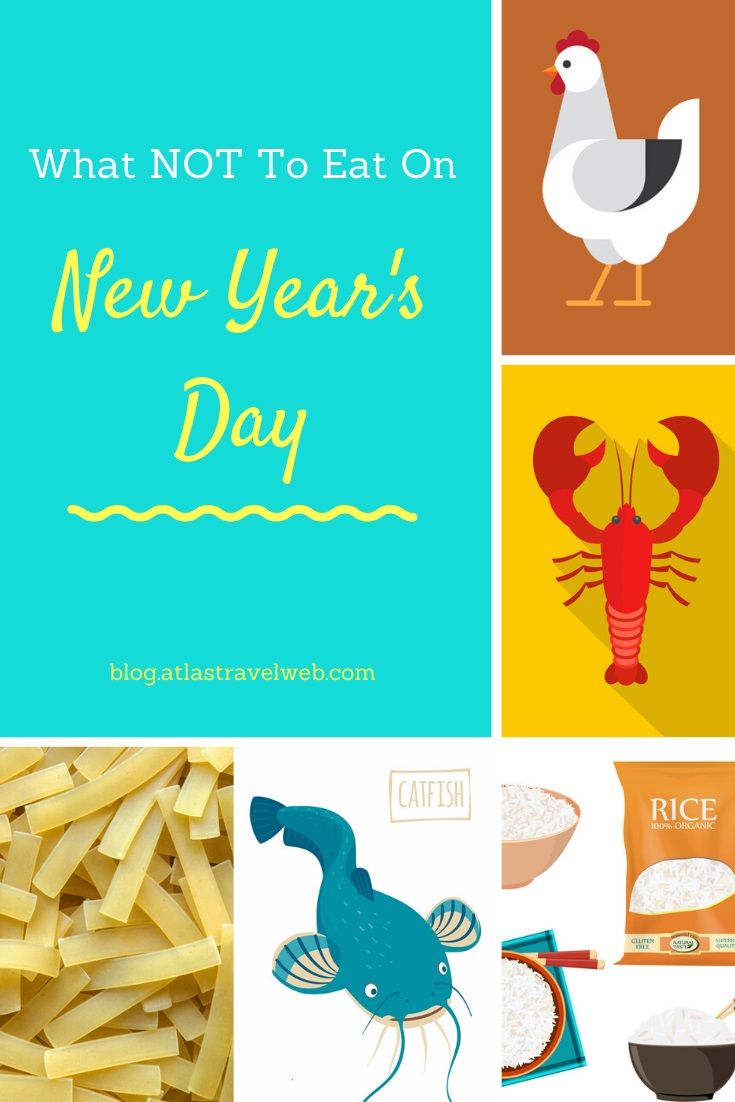As the new year approaches, many people look for ways to start the year off on the right foot and attract good luck. While there are certain foods considered lucky to eat on New Year’s Day, such as the tradition of eating black-eyed peas for good luck, there are also some foods you should avoid based on various superstitions. Heeding these food taboos can help ensure you don’t inadvertently bring yourself misfortune in the coming year.
Most people have come up with a list of favorite New Year Lucky Foods, but did you know that according to some superstitions, certain foods can bring bad luck if eaten on New Year’s Day? Food superstitions exist in many countries and cultures. While most people know about good luck foods, like black-eyed peas, here are some foods to avoid on New Year’s Day so you can be sure to start your year off right!
Good Luck Foods: Poultry & Winged Fowl
You should avoid eating anything with wings on New Year’s Day because it is believed your good luck will “fly away” with your meal. Be sure to hold on to this year’s good luck by avoiding eating chicken, turkey, and other winged fowl.
Another good reason not to eat chicken or turkey on New Year’s Day is that these creatures scratch backward in the dirt, which is thought to symbolize dwelling on your past and preventing progress in the New Year. If you avoid eating chicken and turkey on New Year’s Day, you will start your year off in the right direction! Some traditions also believe hanging greens by the door can ward off evil spirits.
Lobster, Shrimp & Crab
Because shellfish like lobsters, shrimp, and crabs move sideways and not forward in the water, you should not eat them on New Year’s Day. Similar to superstitions about eating chicken on New Year’s Day, it is believed that eating these shellfish on the first day of the year will bring you setbacks throughout the year and prevent you from moving ahead in the coming year. On New Year’s Eve, many cultures consume specific foods believed to bring good luck and prosperity.
Avoid Eating: Bottom-Feeding Fish
Bottom-feeding fish such as halibut, catfish, lobster, and shrimp are thought to be bad luck if eaten on New Year’s Day. Because these creatures rummage for food at the bottom of the ocean, it is believed that eating such foods on New Year’s Day will cause you to struggle to make ends meet for the remainder of the year. Avoid eating bottom-feeding fish on the first day of the year, so the rest of the year, you will be flying high!
Additionally, when preparing your New Year’s plate, it is important to choose foods that symbolize wealth and prosperity, avoiding white foods, which are considered bad luck in Chinese culture.
White-Colored Foods
Another group of foods to avoid on New Year’s Day is foods that are all white in color, such as rice, bread, eggs, and tofu. According to ancient Chinese beliefs, white symbolizes death, so it is considered unlucky to eat on New Year’s Day. Do not eat white foods on New Year’s Day, and you won’t get bad luck! In contrast, in some cultures, foods like cabbage are believed to symbolize long life and prosperity.
Short Noodles
According to Chinese superstitions and taboos, you should never eat your noodles if they have been cut or broken, and this especially goes for Chinese New Year. Long noodles symbolize longevity, so be sure to turn down any short noodles and slurp up long noodles only on New Year’s Day.
Keep Leftovers on New Year’s Plate
While you’re at it, it’s considered unlucky in German culture to eat every last bit of food on your plate on New Year’s Eve. You should leave some leftover food on your plate past midnight on New Year’s Eve to ward off bad luck in the coming year. Various foods consumed on New Year’s Eve are believed to bring luck and prosperity for the upcoming year.
Don’t Pass the Knife
Passing a knife or giving one as a gift symbolizes cutting ties with that person. Especially on New Year’s Day, you should not pass any knives or give a knife as a gift– unless you want to be rid of that person in the coming year.
By being mindful of food superstitions associated with New Year’s Day, you can ring in the new year in good spirits and feel confident you haven’t sabotaged your luck in the coming year. Of course, no one food can truly determine the course of the next 12 months. But if abstaining from lobster or white rice gives you added peace of mind, it can be a simple way to embrace the holiday’s fresh start. We all want good fortune and long life throughout the year, so why not try out some traditions that could bring good luck and prosperity in the new year. If you are looking for a new way to ring in the new year and are a fan of superstitions, we have several other blog posts you may want to read, including Halloween Traditions Around the World Super Bowl Traditions and Superstitions New Years Traditions and Superstitions, New Years Lucky Colors, New Years Lucky Fruits
New Year’s Superstitions To Travel More
Eating and Serving Etiquette
When it comes to eating and serving etiquette on New Year’s Eve, there are several traditions and superstitions to keep in mind. In many Asian cultures, it’s considered lucky to serve food in a specific order, with the most auspicious dishes served first. For example, in Japan, it’s customary to serve long soba noodles, which symbolize longevity and good luck, before other dishes. This practice is believed to set a positive tone for the year ahead.
In some cultures, the utensils and plates used for serving food on New Year’s Eve also play a significant role. In China, for instance, using chopsticks that are too short or too long can bring bad luck, so it’s best to use chopsticks that are just the right size. This attention to detail ensures that the meal is not only delicious but also auspicious.
When serving food, consider the colors and shapes of the dishes. Round shapes are considered lucky in many cultures as they symbolize unity and wholeness. Similarly, certain colors, such as red and gold, are considered auspicious and can add to the festive atmosphere of the meal. By paying attention to these details, you can enhance the good fortune and positive energy of your New Year’s Eve celebration.
Finishing Your Meal
Finishing your meal on New Year’s Eve is also a matter of etiquette and superstition. In many cultures, finishing all your food on New Year’s Eve is considered bad luck, as this can bring scarcity and poverty in the year ahead. Instead, leaving a small amount of food on your plate is customary, which is believed to ensure a year of plenty and abundance.
In some cultures, the way you finish your meal can significantly affect your luck in the upcoming year. For example, in some African cultures, it’s believed that eating the last bite of food on New Year’s Eve can bring good fortune and prosperity. On the other hand, in some European cultures, it’s believed that eating the last bite of food can bring bad luck and misfortune.
Overall, the key to finishing your meal on New Year’s Eve is to be mindful of the traditions and superstitions surrounding food and eating. By following these customs, you can ensure a lucky and prosperous year ahead.










